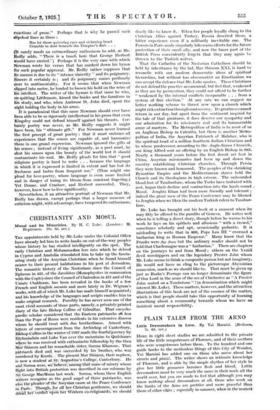CHRISTIANITY AND MOSUL
Mosul and its Minorities. By • H. C. Luke. (London : M.
• Hopkinson. Ns. 6d. net.)
This appointments held by Mr. Luke under the Colonial Office have already led him _tnwrite.books. on out-of-the-way peoples whose history he has studied' intelligently on the spot. The early Christian and Moharruiaedan lore into which he delved in Cyprus and Anatolia stimulated hilt' to take up the fascin- ating study of the Assyrian Christians when he found himself nearer to their present habitations in his post at Jerusalem. The romantic history of the Nestorians since the Council of Ephesus in 431, of the Jacobites (Monophysites in communion with the Copts) since the Council of Chalcedon in 451 and of the Uniate Chaldeans, has been revealed in the books of a few French and English, savants and more lately in Dr. Wigram's works, with all of which Mr. Luke has made himself acquainted ; and his knowledge of the languages and scripts enables him to make original research. Possibly he has never seen one of the most vivid accounts of those parts, namely; a privately printed diary of the late •Bishop Collins of Gibraltar. That encyclo- paedic scholar considered that the Eastern patriarchs r6!) less than the Pope of Rome were residents in his extensive diocese whom he should treat with due brotherliness. Armed with letters of encouragement from the Archishop of Canterbury, l3thop Collins in the winter of 1907 made the fearful journey by Whmiadzin and Lake Van over the moOntains to Qudshanes where be was received with enthusiastic fellowship by the then Mir Shimun and his remarkable siker,- Surnia• Khanurn. That pittriarch died and was inCOeedecl- bST his :brother, who was murdered by Kurds. ; The present Mar Shimun, their nephew,- is now a student at St:Augnstine's College; Canterbury. He • atid Surma were, weciielieve;:aitiorigitiat ina:ss'of misery whose flight into British protection was described in our columns by Sir George MacMunn last week. Surma, whom these English Writers recognise AS the good angel of three patriarchs, was atsii the:pleadercif-the-Agsyriari cause at the Peace Conference in Paris. Though, for all her Christian gentleness, we should , frPoir" her WCistern w-e shciuld dearly like to know it. When her people loyally clung to the Christian Allies against Turkey, Russia deserted them, a bitter experience even if a militarily inevitable one. The Powers in Paris made singularly lukewarm efforts for the future protection of their' small ally, and now the baser part of the British Press conveniently forgets that they may again be thrown to the Turkish wolves.
That the Cathedra of the Nestorian Catholicos should be held by inheritance by the lad, Mar Shimun XXI, is hard to reconcile with our modern democratic ideas of spiritual hierarchies, but without too obscurantist an Erastianism we can accept the defence that Mr. Luke quotes. These Christians do not defend the practice as canonical, but feel that, weakened as they are by persecution, they could not afford to be further
"weakened by the internal conflicts inseparable . . . from a system of free election." At any rate we can suggest no
better working scheme to thrust now upon a church which might risk extinction through controversy. Its greatness cannot return in our day, but apart from the sentiment inspired by the tale of that greatness, it does deserve our sympathy and our admiration for its missionary zeal and its innumerable army of martyrs. The Metropolitan of India is to most of us an Anglican Bishop in Calcutta, but there is another Metro- politan of India, the Assyrian Patriarch of Malabar, who is the spiritual head of a million Southern Indian Christians and to whose predecessor, according to the Anglo-Saxon Chronicle, our King Alfred sent an offering by an English Bishop in 883. Nearly a thousand years before the first Jesuit set foot in China, Assyrian missionaries had been up and down the country establishing Christian churches. Through Persia they were known and honoured. The peoples of the shrinking Byzantine Empire and the Mediterranean shores held the Church and its theologians in high esteem. The unbounded blood-lust of Tamburlane, whom the Turks have imitated with zest, began their decline and contraction into the lands round . Mosul. Jenghiz Khan had been more friendly and tolerant ; indeed the great men of the Peace Conference may be likened to Jenghiz when we liken the modem Turkish rulers to Tambur- lane.
Mr. Luke has brought out his book at a moment when its may fitly be offered to the pundits of Geneva. He writes well when he is telling a direct story, though before he warms to his work he lays on his epithets and allusions "with a trowel," sometimes scholarly and apt, occasionally pedantic. It is
misleading to write that in 800, Pope Leo III "crowned a barbarian king as Roman Emperor." Many know that the Franks were Pdp Papot but the ordinary reader should not be told that Charlemagne was a" barbarian." There are chapters on the journeys to and from Mosul ; others on the Yezidi devil worshippers and on the legendary Pre-ster John whom Mr. Luke seems to think a composite person but not imaginary. He would not have us cling to the picturesque Abyssinian connexion, much as we should like to. That must be given up just as Burke's Peerage can no longer denominate the figure of Our Lord in the arms of the see,of Chichester as "A Prester John seated on a Tombstone" ! (a denomination which might interest Mr. Luke). These matters, however, and the attractive illustrations of this book are not of the essence of the matter, which is that people should take this opportunity of learning something about a community towards whom we have an insistent moral responsibility.


























































 Previous page
Previous page